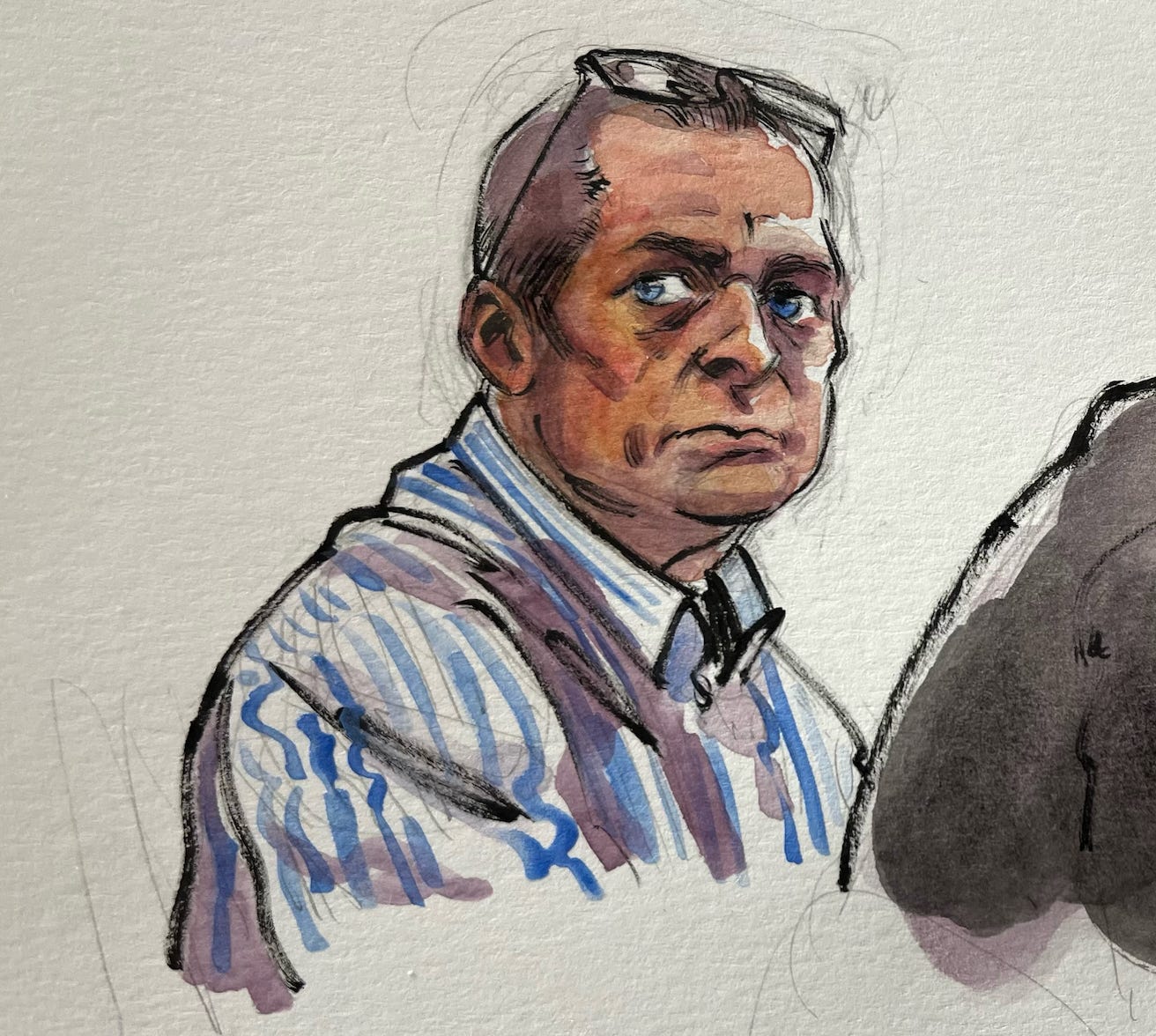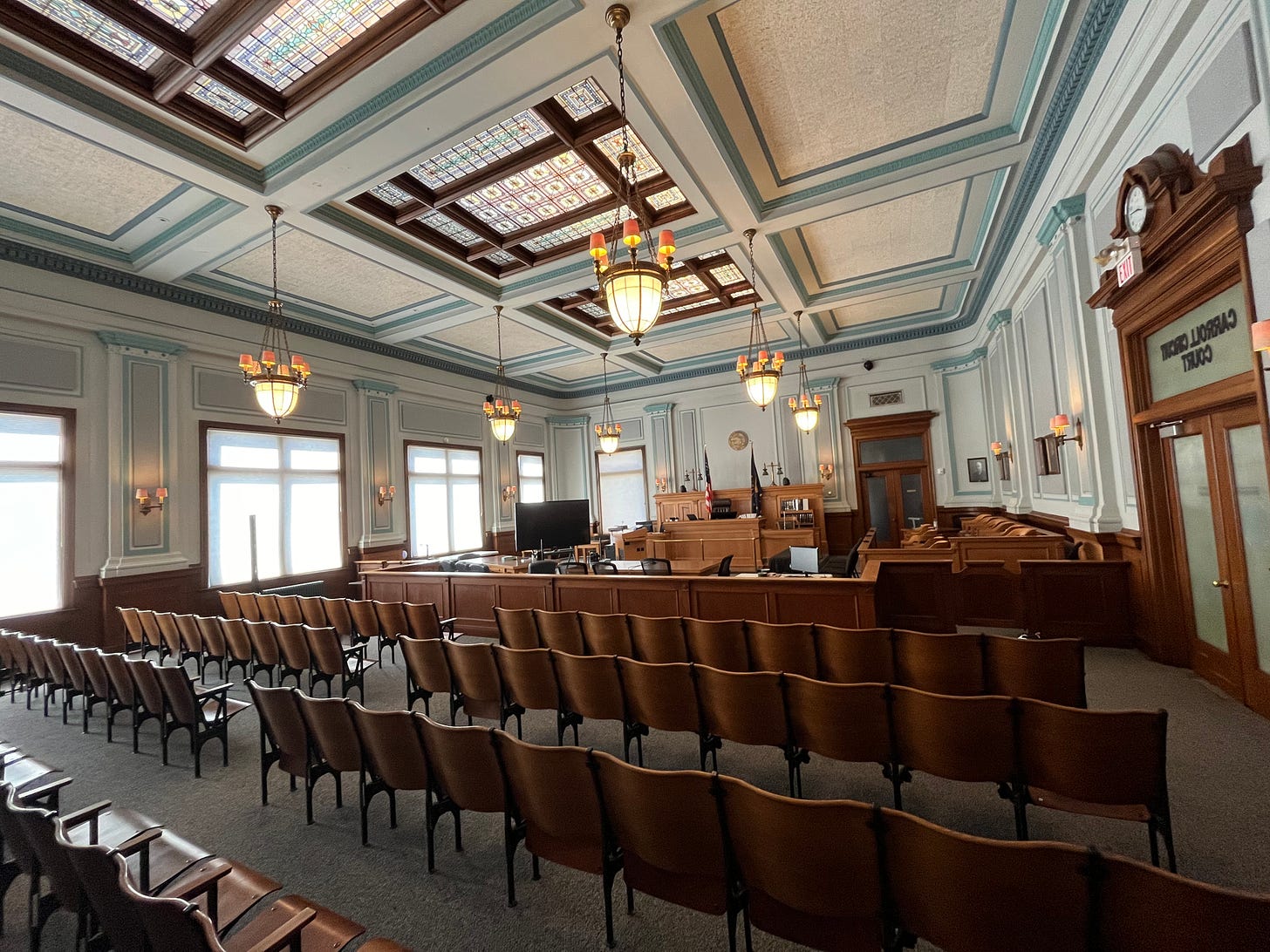Attorneys for Richard Allen filed a string of motions this week calling out what they deemed errors in his trial that warrant vacating his November 2024 conviction in the 2017 murders of Delphi eighth-graders Abby Williams and Libby German.
A motion to correct errors, filed late Monday, challenged evidence at trial used to back the prosecution’s timeline of the murders. They also contend that Allen was deprived of legal counsel during a process that landed him in a state prison under a “safekeeping” order – a situation they called pivotal in the case and that led to a state of psychosis between his arrest and his trial.
The court filings were separate from an appeal that Allen told Judge Fran Gull that he planned to pursue when he was sentenced Dec. 20, 2024, in Carroll Circuit Court.
Gull sentenced Allen, a 52-year-old former clerk at a CVS pharmacy in Delphi, to 130 years in prison, the maximum allowed for the two murders.
Abby Williams, 13, and Libby German, 14, were found dead, with slashed necks, in the woods near Delphi’s Monon High Bridge Trail on Feb. 14, 2017, a day after they’d been dropped off to spend an afternoon hiking to the Monon High Bridge.
Allen was arrested in October 2022, 5½ years after the murders – tied to the scene through a revisited case file related to his self-reported information to investigators in the days after the murders that he’d been on the Monon High Bridge Trail the day the girls went missing. The case against him was built around his admission about being on the bridge that day, an unspent round found at the crime scene that state police technicians determined came from a handgun Allen owned and a video of a man – dubbed “Bridge Guy” – found on Libby’s phone.
A jury, selected from Allen County, 90 miles from Delphi, delivered a verdict Nov. 11, 2024, that Allen was guilty on four counts of murder. That followed four days of deliberation after 18 days of testimony and closing arguments in Carroll Circuit Court.
Allen’s defense team – attorneys Brad Rozzi, Andrew Baldwin and Jennifer Auger – maintained during the trial and in the weeks that have followed that investigators and the prosecution got the wrong guy.
In this week’s filing, Allen’s defense team pointed to what they considered reasons to vacate the conviction. Among them:
Representation during “safekeeping” order procedures: The motion contends that Allen’s wife, Kathy, had hired attorney Brett Gibson to represent him a day after he was arrested on Oct. 26, 2022. The motion says that Gibson met with Allen at the Carroll County Jail, where Allen was being held under a pseudonym. According to the filing, then-Carroll Circuit Judge Benjamin Diener held an initial hearing on Oct. 28 without Allen or his attorney present, before Allen “was whisked away from Carroll County Jail to the White County Jail without a safekeeping order authorizing the transfer.” Diener granted a safekeeping order then-Carroll County Sheriff Tobe Leazenby requested on Nov. 3, 2022.
This week’s motion argues that Allen wasn’t present for the safekeeping order hearing, he had no representation at the hearing and claimed that Diener had a hand in helping craft the order. Allen wound up at Westville Correctional Facility on the grounds that Carroll County couldn’t guarantee his safety in its jail, given the high profile of the case. Allen’s attorneys also argued that he could have rejected the safekeeping order but wasn’t given that opportunity.
“The safekeeping proceeding was plainly illegal from start to finish,” Allen’s attorneys wrote, saying Allen’s Sixth Amendment rights were violated. “Mr. Allen, either personally or through his lawyer, Mr. Gibson, had no notice of the legal skullduggery that would land him in solitary confinement at the Westville Control Unit, Wabash Valley Correctional Facility and Cass County Jail for 23 months pending trial. Because Mr. Allen had no notice of what was afoot, neither he nor his lawyer could make any of the arguments that would have necessarily prevented Mr. Allen’s transfer.”
In a footnote, Allen’s attorneys wrote: “The court need not speculate whether safekeeping proceedings have serious consequences for an accused. In addition to being moved hours away from his lawyers, for over 23 months, Mr. Allen was unconstitutionally kept in solitary confinement in an Indiana Department of Corrections prison and was shackled, leashed and hooded and deprived of human contact. … As a consequence of that torture, Mr. Allen became psychotic. Short of his death, it is hard to imagine more serious consequences for Mr. Allen flowing from the Nov. 3 safekeeping ‘proceeding.’”
During the trial, Allen’s attorneys tried to make the case that 60-plus confessions Allen offered after his arrest stemmed from his declining mental and physical health, due in large part to the prison conditions.
The timing of the white van: During the trial, prosecutors focused testimony of Dr. Monica Wala, a psychologist at Westville, about a confession she said Allen made to her. Wala had testified that Allen described details about forcing the girls off the Monon High Bridge with the intent of raping them, only to get scared when he spotted a passing white van – a piece of the timeline investigators later said was something only the killer would know. Wala testified that Allen told her that after he saw the van go by, he’d crossed to the north side of Deer Creek and killed the girls there.
During the trial, Brad Weber, a Delphi resident who lives just southeast of the south end of the Monon High Bridge, testified that he got off his shift at the Lafayette Subaru plant at 2:02 p.m. Feb. 13, 2017 – the day of the murders – and drove home. He said it took 20 to 25 minutes to get home. That put him home, based on his testimony, “about 2:30.”
Libby German shot a final video – the one capturing the image and voice of a suspect known as Bridge Guy – at the southwest end of the Monon High Bridge at 2:13 p.m. Feb. 13, 2017. Prosecutors marked the final movement of Libby’s phone at 2:32 p.m. that day, based on tracking data logged by the phone’s Apple Health app.
In this week’s filing, Allen’s attorneys included security video footage of a white van pulling into Weber’s lane at 2:44 p.m. that day. They also contend that Weber’s cellphone started to ping at the property at 2:50 p.m. that day and continued deep into that night. They said the footage, collected from a neighbor’s security camera by state investigators, suggest that prosecutors knew Weber’s testimony didn’t fit the timeline and didn’t correct it.
“His arrival at ‘about 2:30’ could not have been a detail only the killer would know, because it did not happen,” Allen’s attorneys wrote in this week’s motion.
Another potential confession: Allen’s attorneys argued that another Delphi man confessed to the murders while talking with a fellow inmate in May 2017. According to handwritten notes and summaries collected by an Indiana State Police detective, the inmate alleged that the Delphi man said he’d used a boxcutter to kill the girls after walking with them in the woods with the pretense of going to see some horses nearby.
Allen’s attorneys, in their motion, pointed to testimony from Dr. Roland Kohr, a former Vigo County coroner who had led the autopsies on Feb. 15, 2017. On the stand in October, Kohr said he’d come to the conclusion in later years that the weapons used weren’t a combination of a straight edge and a serrated edge – as he’d first concluded – but a boxcutter that could have left serrated-like markings from “something related to the blade or handle.” That changed conclusion took the defense by surprise at trial.
“If, instead of for the first time at Mr. Allen’s trial, Dr. Kohr had seven years earlier said the girls could have been killed by a boxcutter, there would certainly have been probable cause to arrest and charge” the other Delphi man, Allen’s attorney’s wrote.
Evidence from Libby’s phone: During the trial, Stacy Eldridge, a digital forensics consultant for Richard Allen’s defense team, testified that Libby’s iPhone 6S logged an audio output deep in the phone’s software, suggesting that headphones or a car aux cable was put into the phone’s jack port at 5:44 p.m. Feb. 13, 2017. She testified that data showed that someone removed the headphone jack at 10:33 p.m. that same night. That testimony challenged the prosecution’s timeline of the murder by hours.
That day at trial, an Indiana State Police phone expert testified that during a break in the trial he’d Googled possible reasons for the headphone jack issue. He testified that he found reasons on Apple troubleshooting sites including moisture and dirt. Allen’s attorneys, in this week’s motion, offered an affidavit in which Eldridge says there was no evidence of water or dirt damage and was “unaware of any scientific or technological research suggesting that water or dirt damage to an iPhone 6s would cause the phone to inaccurately log wired headphones in or wired headphones out.”
Allen’s attorneys argued: “Someone other than Richard Allen was handling (Libby’s) phone multiple times long after the state contended Mr. Allen left the scene before 4 p.m. on Feb. 13, 2017.”
As of Tuesday, the court and prosecutors had not responded to Allen’s motion.
Thank you for supporting Based in Lafayette, an independent, local reporting project. Free and full-ride subscription options are ready for you here.
Tips, story ideas? I’m at davebangert1@gmail.com.





